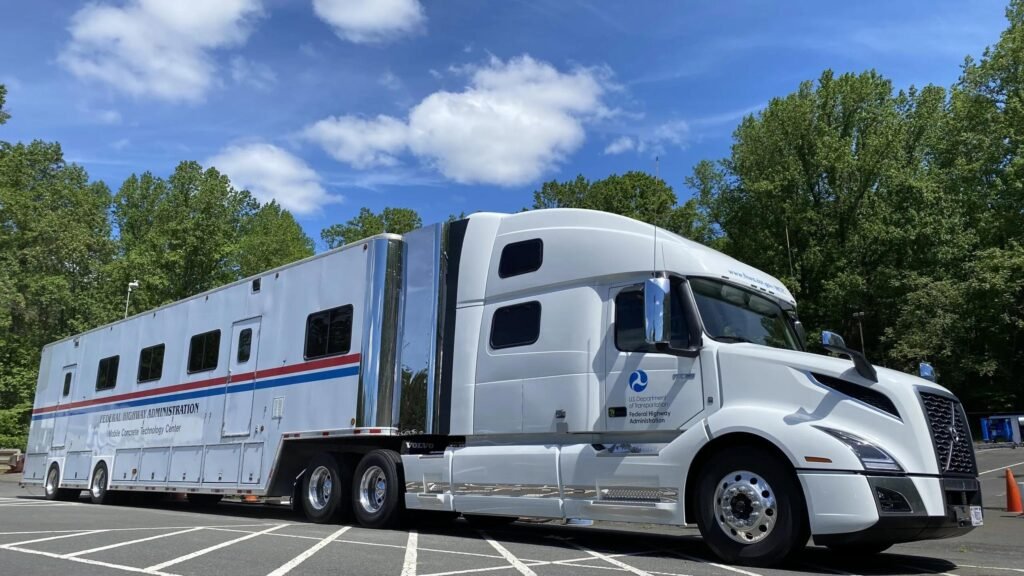Advancing Concrete Innovation: The Mobile Technology Research Hub
The concrete industry continually evolves through swift technological advances. The Federal Highway Administration’s Mobile Concrete Technology Center (MCTC) stands as a pioneering initiative transforming how professionals approach concrete research and implementation across the United States. This traveling laboratory brings cutting-edge solutions directly to construction sites and educational institutions nationwide.
The Evolution of Mobile Concrete Technology
The MCTC emerged in the late 1980s when officials recognized a considerable gap between laboratory innovations and real-world applications. Engineers needed better access to emerging concrete technologies. The center travels extensively throughout America, primarily visiting state department of transportation sites working on specialized projects requiring advanced equipment.
When arriving at a location, the MCTC presents an impressive array of state-of-the-art technology focused on crucial aspects of concrete development – materials selection, mixture design, field testing capabilities, and comprehensive pavement evaluation methods. This mobile approach eliminates barriers that previously hindered technological adoption.
The facility doesn’t just demonstrate equipment though. It serves as a dynamic platform for knowledge transfer between researchers and practitioners who sometimes struggle accessing current innovations. Students at Auburn University witnessed this firsthand when the center visited in March 2024, providing both theoretical presentations and hands-on demonstrations of concrete testing procedures.
Technical Capabilities and Strategic Focus
Equipment housed within the MCTC represents the progressive edge of concrete technology. The center’s expertise spans numerous intricate domains. Performance Engineering Mixture specifications, quality assurance protocols, nondestructive testing methodologies – these constitute merely the beginning of their technical repertoire.
Surface resistivity testing exemplifies the type of specialized analysis available through the mobile center. Such advanced methodologies allow for field assessment that previously required extensive laboratory facilities, thereby transforming the feasibility threshold for implementing rigorous quality control.
The center maintains significant partnerships with manufacturers, contractors, industry associations, and academic institutions which drives its continuing relevance. These collaborative relationships enable the MCTC to remain at the technological forefront despite the constantly shifting landscape of materials science.
Impact on Industry Practices
Concrete workability and innovative test methods receive particular attention from the MCTC team. By introducing these methodologies directly to working professionals, the center accelerates adoption rates dramatically compared to traditional information dissemination channels.
Long-life pavements and concrete durability represent additional focus areas where the mobile center contributes substantial knowledge. The practical demonstrations provided help bridge theoretical understanding with application expertise, creating a more seamless implementation process.
Michael Praul, a senior concrete engineer with the Federal Highway Administration, regularly presents on the historical trajectory and future possibilities of concrete technology during MCTC visits. These educational components complement the hands-on demonstrations by providing essential context for emerging methodologies.
Future Directions and Challenges
While primarily known for concrete-specific applications, the center increasingly recognizes value in comparing concrete and asphalt solutions. This comparative approach promises to fuel cross-material innovation while potentially reducing costs for public infrastructure projects.
The MCTC continues evolving its mission as construction materials advance and testing methodologies refine. Modern emphasis includes exploring sustainable concrete formulations that maintain structural integrity while reducing environmental footprint.
Transportation departments face mounting pressures to deliver durable infrastructure amid budgetary constraints. The mobile technology center addresses this challenge through promoting more efficient quality assurance processes that optimize material performance despite resource limitations.
Since beginning its journeys several decades past, the MCTC has substantially transformed how concrete technologies transition from laboratory development to field deployment. By physically bringing advanced testing capabilities directly to construction professionals, it has established itself as an indispensable component of America’s concrete innovation ecosystem.
The center exemplifies how mobile demonstration units can effectively collapse the implementation timeline for construction technologies. When professionals directly interact with new methodologies under expert guidance, adoption barriers diminish significantly compared with traditional technology transfer approaches.

